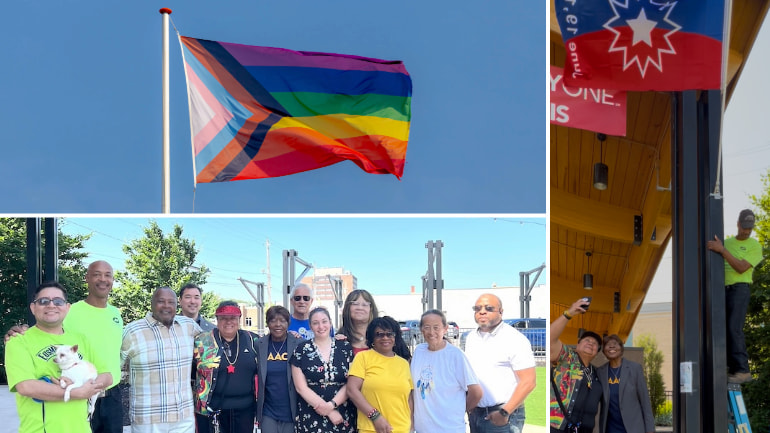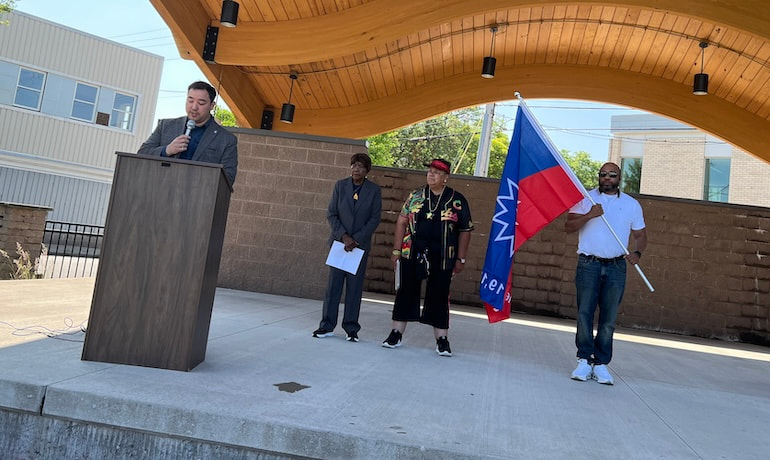We could have protested. We could have plastered the media with another tale of a city divided over LGBTQ+ issues. We could have provided some great fodder for the screens, and a big platform for some angry, eager voices.
Instead, my hometown of East Moline, Ill., did something a little old-fashioned this summer. We turned to our city council and city employees to do their jobs outside of the glare of media and the tension of activism.

Above, lower photo shows city officials, city workers, residents of East Moline and leaders of the Rock Island NAACP gathered to celebrate the installation of the Juneteenth flag. At right, Belinda Rusch and Bonnie Ballard grab a photo while a city worker installs the Juneteenth flag. Top: an illustration of a Progress Pride flag like the one to be installed in Runner’s Park Friday.
We also did something else, as we took on the topic of an LGBTQ+ Pride flag flying somewhere on public city property. We insisted that it’s not just about a Pride flag, or about LGBTQ+ people. We insisted this conversation was about diversity, and how flags on city property represent diversity as a key quality of East Moline, a town rooted in the contribution of Hispanic and Black Americans.
Friday afternoon, this labor of civic love over flags reaches a second peak in just over a week. At 1 p.m., The City of East Moline will hold a ceremony celebrating the flying of the Progress Pride flag in its quaint Runner’s Park, along 15th Avenue.
This ceremony comes eight days after East Moline celebrated flying — also for the first time ever — the flag of Juneteenth, the annual holiday that marks the date when America’s last remaining slaves were finally set free in 1865.
And it’s part of East Moline becoming the first city in the Quad Cities to pass an overall flag policy, one that authorizes commemorative flags in Runners Park for not just Pride Month and Juneteenth, but also 10 other Holidays, 11 other Awareness Months, and eight “heritage days or months” that symbolically recognize Hispanic Americans, Native Americans, Asian-Americans, Pacific-Islander Americans, Jewish Americans, Caribbean Americans, and Indigenous people.
This is a step East Moline should be especially proud of, because it happened with so little conflict and in a way that honors the very deepest founding of our country: through a civil democratic process. Take a closer look at the whole thing:

Above, Ald. Olivia Dorothy, Rock Island NAACP President Bonnie Ballard, and Ald. J. Robe Rico with his dog Snuppy.
Pride flags in East Moline a long-time goal
A drive for East Moline to honor the Pride Month of June with Pride flags started in 2020. Pride Month grew out of the Stonewall Uprisings in 1969, when LGBTQ+ people in New York City stood up against a run of police brutality.
2020 is when an East Moline resident first approached Ald. J. Robe Rico about flying Pride flags somewhere on city property. It was a gesture already undertaken by the city of Rock Island, which posts Progress Pride flags along a main thoroughfare annually since 2019 through a collaboration with Clock Inc. LGBT+ Community Center and without a policy.
Rico offered the idea of displaying Pride flags to his council colleagues at the time, but received no support.
He proposed the policy again in 2021, with the support of former alderperson Larry Toppard, who has since passed on. A growing wave of controversy and court cases in other cities left the proposal stymied again.
The issue sat dormant in East Moline for four years, while more cities and counties nationwide found themselves in flag-related controversies. Elk Grove Village, Buffalo Grove, Glenview, and Arlington Heights in Illinois — plus Ottumwa in Iowa — are just a few communities that experienced flag conflicts.
Court cases emerged nationwide against cities that posted Pride flags, claiming they were upholding one special interest group above others.
The whole situation came to a head in 2022, when the U.S. Supreme Court ruled against the city of Boston for refusing to fly a Christian flag for fear it would violate the U.S. Constitution by glorifying one religion over another. The ruling also outlined how cities with flag policies that have clear guidelines and flag policies can protect themselves from situations like the one Boston went through.
This year, with the Supreme Court ruling providing guidance and a new council, Rico proposed the policy yet again. Adam Guthrie and Olivia Dorothy joined on in support of an early-draft flag policy that initially authorized a Pride flag, a Juneteenth flag, and another 19 flags associated with causes, awareness of human conditions like autism or disabilities, or holidays.
The policy was tabled once more — but this time, it didn’t just fade away. Just as importantly, controversy, conflict and protest did not break out.

Above, City Administrator Mark Rothert speaks at East Moline’s Juneteenth flag ceremony while East Moline activist Belinda Rusch, Rock Island NAACP President Bonnie Ballard, and Vice President Kermit Thomas listen.
Historical recognition of diversity at heart of East Moline flag process
Instead, a small group of East Moliners (including myself) who had spoken in support of the Pride flag tamped down calls from peopel outside of East Moline seeking to protest. We also focused on a broader goal: inclusion in the flag policy of a flag honoring the contribution of Hispanic American citizens.
The city came back with more than we expected: a new policy that not only recognized Hispanic American Heritage Month, but the other nine “heritage” months mentioned above, for a total of 30 authorized flags.
The diversity represented in that flag policy is unprecedented. And it’s only fitting: almost 50 percent of East Moline’s 21,000 residents are non-white, the highest percentage among all seven Quad Cities, by far.
East Moline is also home to one of Illinois’ largest recognitions of the Mexican-American holiday of Cinco de Mayo. Its mayor is Black, and Watertown (East Moline’s original Hispanic neighborhood) is also where the late jazzman Nate Lawrence grew up.
When the revised flag policy came before the council June 2, the local Republican Party launched a last-minute effort to single out the Pride flag for removal. But the politicking failed, and by a vote of 6-2, the East Moline City Council approved its vastly inclusive flag policy — Progress Pride flag and all.
Above, Belinda Rusch’s speech last week about East Moline’s new flag policy.
The intersecting has continued:
• Choice Properties, the mobile home park along the river, and its manager Jake Bazor donated the Juneteenth flag that is flying now.
• The NAACP is expected to have representatives attend Friday’s flag ceremony.
• Rico and Dorothy, who spearheaded conversations with the NAACP to organize last week’s Juneteenth ceremony, will co-serve as emcees Friday.
• Speakers tomorrow will include Adam Peters, a frequent speaker at other Quad Cities’ Pride proclamation resolutions and the co-leader of Clock Inc.; Lindsey Svetlick, a leader at Hope United Church of Christ in Moline and co-founder of the Affirming Congregations of the Quad Cities, a coalition of eight LGBTQ affirming faith groups from throughout the entire Quad Cities area; Elle Peoples, an East Moliner who spoke out in support of the flag policy, serves on the staff of State Rep. Gregg Johnson, and owns the Elle on Main communications firm; and myself, an East Moline residentand business owner since 2023.
The two council members who voted against the flag policy still attended last week’s Juneteenth ceremony. While they may not attend Friday’s Pride flag-raising, that’s really not the point.
Even the Pride flag we’ll be installing isn’t really THE point.
Instead, the point is: diversity is NOT dead. Polarization does NOT reign in every community, even those where people disagree.
The democratic process still DOES work., and we CAN still rely on it to sort through our stickiest issues, without losing ourselves in conflict and protest.
Hope — and peace — still live. That’s a big part of what tomorrow will honor.

